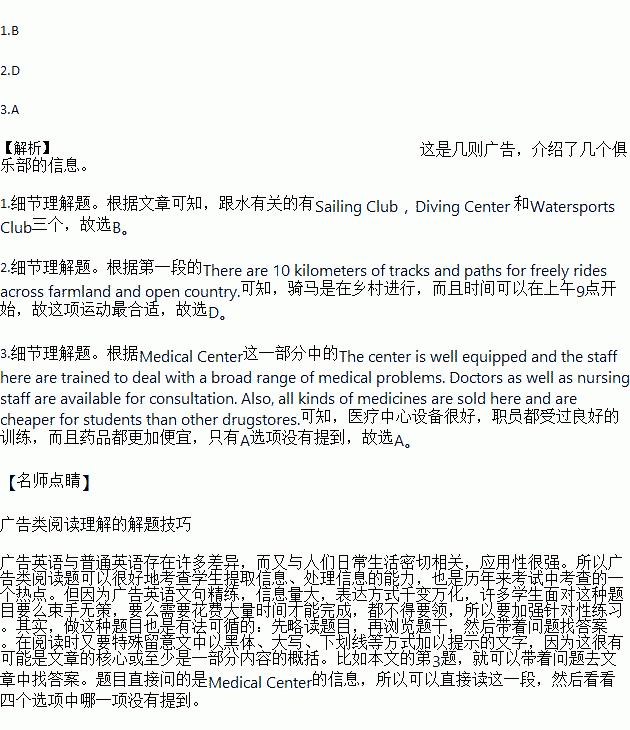题目内容
Riding School:
You can start horse-riding at any age. Choose private or group lessons on any weekdays between 9 a.m. and 8:30 p.m. (3:30 p.m. on Saturdays). There are 10 kilometers of tracks and paths for freely rides across farmland and open country. You will need a riding hat.
Opening Hours: Monday through Friday: 9:00 a.m.—8:30 p.m.
Phone: (412) 396—6754 Fax: (412)396—6752
Sailing Club:
Our Young Sailor’s Course leads to the Stage 1 Sailing qualification. You’ll learn how to sail safely and the course also covers sailing theory and first aid. Have fun with other course member, afterwards in the clubroom. There are 10 weekly two-hour lessons (Tuesday 6:00 p.m.—8:00p.m)
Opening Hours: Tuesdays: 6:00 p.m. —8:00 p.m.
Phone: (412)396—6644 Fax: (412)396—6644
Diving Center:
Our experienced instructors offer one-month courses in deep-sea diving for beginners. There are two evening lessons a week, in which you learn to breathe underwater and use the equipment safely. You only need a swimming costume and towel. Reduced rates for couples.
Opening Hours: Monday and Friday: 6:30p.m-8:30p.m.
Phone: (412) 396—6312 Fax: (412) 396—6706
Medical Center:
The staff of the Medical Center aim to provide convenient and necessary medical care to students and staff of the university. The center is well equipped and the staff here are trained to deal with a broad range of medical problems. Doctors as well as nursing staff are available for consultation. Also, all kinds of medicines are sold here and are cheaper for students than other drugstores.
Opening Hours: 24 hours from Monday to Sunday
Phone:(412) 396—6649 Fax:(412) 396—6648
Watersports Club:
We use a two-kilometer length of river for speedboat racing and water-skiing. A beginners’ course is made up of ten 20-minute lessons. You will learn to handle boats safely and confidently, but must be able to swim. The club is in a convenient central position and is open daily from 9 a. m to 4 p. m, with lessons all through the day.
Opening Hours: Monday through Friday: 9:00 a.m.—4:00 p.m.
Phone: (412)39606899 Fax: (412) 396-6890
1.How many courses above are involved in water?
A. Two. B. Three.
C. Four D. Five
2.If you want to experience a new activity in the countryside in the mornings, you may fax _______.
A. (412) 396-6706 B. (412) 396-6648
C. (412) 396-6876 D. (412) 396-6752
3.Which is NOT offered by the Medical Center?
A. Nursery for newly-born babies. B. Good equipment.
C. Well trained staff members. D. Various less expensive medicines.
 阅读快车系列答案
阅读快车系列答案

 Everyone who takes part in it will also receive a free pass to enter one school activity this year.
Everyone who takes part in it will also receive a free pass to enter one school activity this year.